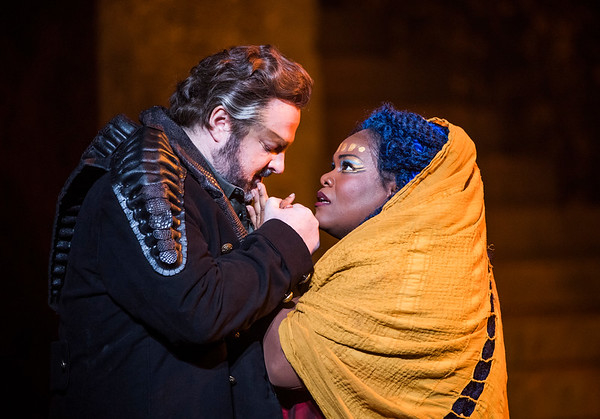Review: Aida (London Coliseum)

©Tristram Kenton
That translation has to go. Edmund Tracey’s superannuated old doggerel, a farandole of consonants and tongue-twisters, turns Verdi’s tragic opera into low-rent Gilbert & Sullivan and lends comfort to those who argue against English National Opera‘s English-only dogma, a policy from which Philip Glass alone is exempt.
The Glass house director, Phelim McDermott, here turns his hand to something less hieratical than either Akhnaten or Satyagraha. Aida is a much-loved tale of slavery, desire, jealousy and burial alive, where the hits keep on coming and passionate hearts adorn exotic sleeves. Yet for all the opera’s charms it’s been a director’s sarcophagus for a good while now as hapless 21st-century creatives have become immured within its 19th-century melodrama.
McDermott fails to buck this trend and presents a production that is dead on arrival. Whatever else this pageant-infused opera demands, it’s a living, breathing heart. We need to see and feel the ardour that sends its central trio hurtling towards a horrific conclusion, but here instead we’re treated to a night of style over substance. The private scenes are played out in front of a drop curtain, their life in two dimensions redolent of profiles on an Egyptian vase; the public world is a geometric landscape of rectangles, trapeziums and isoceles triangles. And oh, the symmetry. It gets everywhere, even when it doesn't make any natural sense.
The whole is stylishly designed by Tom Pye and exquisitely lit by Bruno Poet, but the emotional impact is glacial. Where there should be pomp and majesty there are artful tumblers and billowing silks; characters are dressed in a hotch-potch of styles that mitigate against aesthetic coherence and human sympathy. In Act 1, for instance, we know that Amneris is a bad’un because costume designer Kevin Pollard has decked her out as an artfully folded table napkin.
Thank goodness for the ENO Chorus and Orchestra. The extended summer layoff has not blunted the excellence of this remarkable body of musicians, and Keri-Lynn Wilson conducted Verdi’s score with a blend of elegant flow and dramatic propulsion. She it was who provided the dramatic glue this opera sorely needs.
A refreshingly strong team of singers was led by Latonia Moore‘s startlingly well sung Aida, a role she invested with as much conviction and pathos as the production allows, and by Gwyn Hughes Jones as a properly heroic Radamès. His opening aria, the immortal "Celeste Aida", resounded magnificently; after a tentative start he took it to the limit and thereafter never looked back. The one thing the Welsh tenor does not do, however, is melt the heart through subtle acting.
Robert Winslade Anderson (covering for an indisposed Brindley Sherratt) was a fine Ramfis, Musa Ngqungwana an outstanding Amonasro and David Webb excellent in his brief intervention as a Messenger. Above all, though, it was Eleanor Dennis who sang the house down with a startling turn as a high-pitched High Priestess. She is a major talent.
Michelle DeYoung – luxury casting as Amneris and happily in splendid vocal shape – seemed understandably ill at ease with the poor English version she was required to sing, but did she really need to sound as though someone had squished her cheeks together? "Occept my hond of frandshup" had me reaching for the surtitles.
Aida runs in repertoire at the London Coliseum until 2 December.










